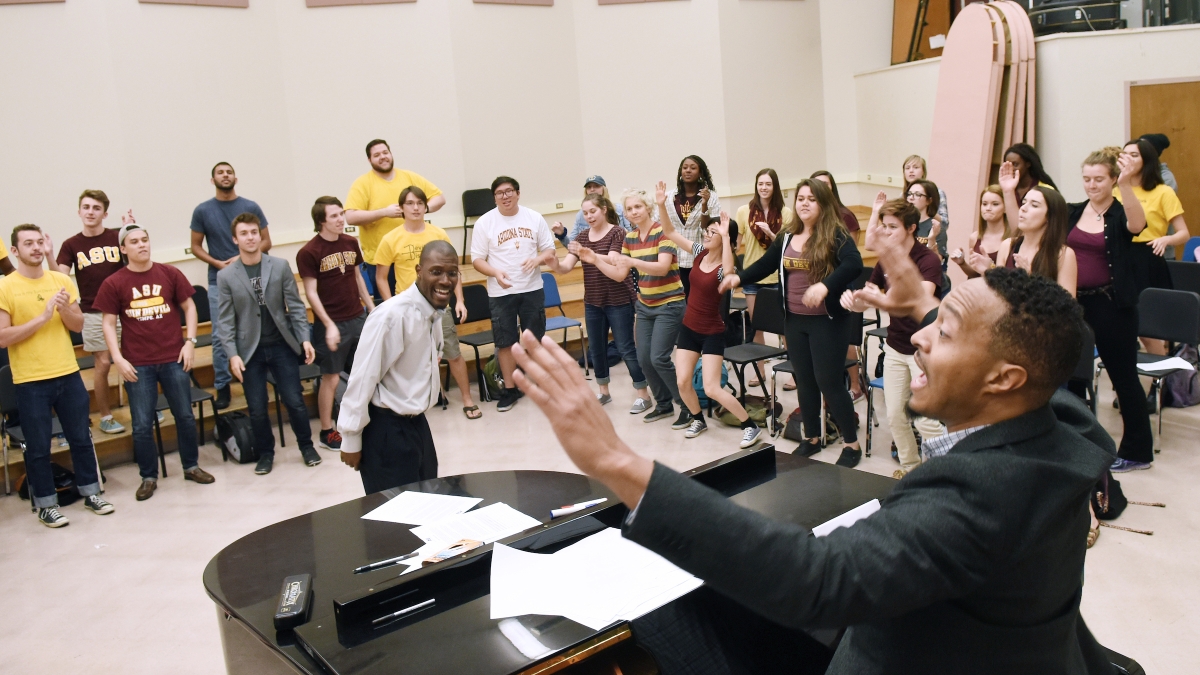School of Music brings ASU's gospel choir back to life

“ASU is really pushing the boundaries for what it means to be musical,” says Jason Thompson (right), assistant professor of music education who directs the ASU Gospel Choir. Photo by Tim Trumble
When the Arizona State University School of Music first relaunched its gospel choir, with new hire Jason Thompson at the helm, 12 people joined. Now, just two years later, the choir boasts 125 members.
Thompson, an assistant professor of music education, grew up in a home that participated in gospel music in multiple ways. His father sang in two church choirs, and his mother was an avid listener and gospel aficionado. He began singing in his church's youth choir in elementary school and eventually became their accompanist when he was in the seventh grade.
Those early experiences provided a unique training ground for his work with gospel choirs as a performer and pianist, and eventually as a director. Before coming to ASU, he taught a similar gospel choir at Appalachian State University, at Cedar Ridge High School in North Carolina, and in multiple churches in North Carolina, Virginia and Illinois.
The gospel choir style, which is known for its inspirational lyrics, vibrant harmonies and energized movements, encourages audiences to participate in the musical experience rather than passively listening from their seat. This combination of factors makes gospel choir performances a crowd favorite and some of the most engaging and participatory musical experiences.
Originating in the early 17th century, gospel music has roots in black oral tradition and is based on the format used during religious services, where hymns and sacred songs were repeated in a call-and-response fashion. Initially, clapping and stomping of the feet were used as rhythmic accompaniment, with most of the singing done a cappella. Today it is common to hear an array of musical instruments in gospel music and a blending of musicals styles, such as blues, hip-hop and Western classical music, and gospel choirs are used in a variety of settings and enjoyed by singers across cultures and contexts.
“The most rewarding part about leading the gospel choir is that singers aren't afraid of being challenged musically,” Thompson said. “They know I set high expectations for the ensemble, and each singer works exceptionally hard to exceed those challenges for gospel music production. In addition, rehearsals are a great combination of fun, skill building and community. That combination makes gospel choir appealing to many singers.”
There are students in the ensemble from a wide range of cultures, backgrounds and religions.
“We do more in gospel choir than just sing,” said Shaylan Richardson, current ASU senior and member of the choir. “We are constantly being challenged to break out of our comfort zones, which allows us to develop strengths that we didn't even know were inside of us. It's amazing to be a part of a choir where everyone is uniquely different and yet we can all come together and sound like one voice.”
The benefits of offering a gospel choir on a university campus are numerous, including musical, sociocultural, historical and peer relations outcomes. Because gospel music is an undeniable part of the American musical tapestry and a connective thread running through many world cultures and several microcultures within the U.S., studying the genre and participating in it is an excellent way to learn about history and culture, to develop knowledge and skills about performance practices, and to work with peers whose ethnic cultures and ideologies may differ.
“Seeing the gospel choir’s growth — both in membership and in community — is wonderful,” said Heather Landes, director of the School of Music. “The ASU School of Music is dedicated to providing students with opportunities to engage in a wide range of musical thought, expression and experiences. The ASU Gospel Choir allows students to study embodied music practices through rhythm and movement and to advance their aural music learning.”
The ASU Gospel Choir is open to students and community members regardless of their faith. In fact, singers participate for a variety of reasons that include social, religious, recreational and musical benefits. The ensemble performs a variety of song forms drawn from the African-American religious tradition, including traditional and contemporary gospel, anthems, hymns and spirituals. It rehearses on Tuesdays and Thursdays from 4:30 to 5:45 p.m. in ASU Gammage 301. To learn more, visit music.asu.edu/ensembles/gospel-choir.
More Arts, humanities and education

ASU professor, alum named Yamaha '40 Under 40' outstanding music educators
A music career conference that connects college students with such industry leaders as Timbaland. A K–12 program that…

ASU's Poitier Film School to host master classes, screening series with visionary filmmakers
Rodrigo Reyes, the acclaimed Mexican American filmmaker and Guggenheim Fellow whose 2022 documentary “Sansón and Me” won the Best…

Pen Project helps unlock writing talent for incarcerated writers
It’s a typical Monday afternoon and Lance Graham is on his way to the Arizona State Prison in Goodyear.It’s a familiar scene.…

